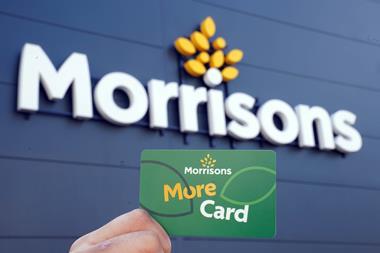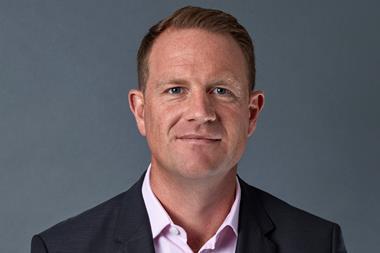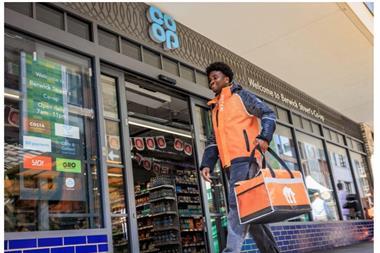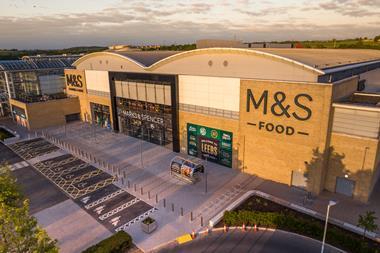Could this one horse race emerge without a winner? Liz Hamson reports
These are anxious times for Safeway. Chief executive Carlos Criado-Perez and his team should have been punching the air when the Competition Commission cleared Morrisons to bid for the chain last Friday - it was, after all, Sir Ken Morrison’s bid they had endorsed all along.
Anticipation soon turned to concern, however, when it emerged the commission had gone one step further and not just barred Asda, Tesco and Sainsbury from bidding for the full portfolio - but also all but a handful of stores divested by the eventual buyer. Limiting the number of runners in the race was one thing. Telling Safeway it had virtually no control over its property portfolio and Philip Green and the circling venture capitalists they could not divest to any of the big three trade buyers quite another.
Now, as Safeway faces up to the prospect of a one horse race for its 480-store portfolio, the question is: will Morrisons take it as a cue to go in lower than the £2.95bn it tabled in January? And if it does, will the Safeway shareholders, whose opening gambit last weekend was to hike the asking price to £3.5bn - 277.5p a share and a £500m cash sweetener - have the balls to walk away if they don’t get what they want? Indeed, would Morrisons?
It’s a tough call. Sir Ken must now believe he has the stronger position. But he will not want to make a bid that misses the mark, forcing a hostile takeover. Safeway may be in the weaker position in that the commission has barred it from selling the 53 stores itself, effectively preventing it from leveraging the asking price. But its powerful shareholders are ignored by Morrisons at its peril.
The consensus is that while Morrisons is
unlikely to substantially increase its bid on January’s, it will make some effort to appease Safeway agitators. Teather & Greenwood analyst, David Stoddart, adds that it will also want to “factor in its bid a price that will deter financial bidders”.
Richard Hull, head of retail at Cap Gemini Ernst & Young, suggests a plausible bid would be 275p a share and a cash sweetener of £200m. But would it meet the expectations of the top 10 Safeway shareholders controlling over 50% of the company and very much in the driving seat?
Tony Foster, UK equities investment director at Scottish Widows Investment Partnership, plays down talk of a Mexican standoff, but states: “The board will try to get the best value for shareholders - it’s their fiduciary duty.” A spokesman close to the board adds: “If the shareholders don’t like the offer, they’ll look at other options, like a management buyout. It’s a possibility.”
There is a feeling that Safeway would find it extremely difficult to find a financial partner given the restriction on selling to trade buyers. Yet Keith Ellis, global head of food and drink, 3i, believes it is not totally implausible: “There may well be a private equity-backed management bid. There is so much money sloshing around in private equity, and nowhere to invest it,” he says pointing to Candover, Cinven and Primera as three potential candidates.
However, talk of an MBO is premature, cautions the Safeway spokesman, adding: “I don’t see our bargaining position as weakened at all - bearing in mind Morrisons wants its bid to be recommended.”
Morrisons could recoup any cash sweetener from the £500m-£600m it is set to raise from the sale of the 53 stores and, he adds, although Safeway’s profits to the end of March dipped, Morrisons has upped the value it expects from the merger’s synergies from £250m to £330m. “Morrisons is interested in the stores, not the profits.”
Safeway’s view is that it is still an attractive buy for venture capitalists because they are “always in the market at the right price”. Philip Green could still enter the fray and change the stakes again. But are the non-trade buyers really still in the game?
The analysts are divided. “Restrictions are such that I don’t think Green can do much now,” comments one, adding that if he were going to run the grocer as a going concern, he would want to ramp up the non-food offer - not as easy a job as with Sainsbury, with which he is now being linked.
Morrisons has jumped a crucial hurdle. But it would take a brave man to call it a done deal. Safeway could still ‘do a Debenhams’ and underwrite a second bidder to kickstart the competition again.
And no-one should write off the possibility of other players joining a saga with more twists and turns than EastEnders. Would it be so off the wall for a financial buyer to acquire the company, sell off the 53 stores and then the rest to Morrisons? Or for Waitrose and M&S to go for a bigger bite of the pie? And there is always the slim chance of a bid from overseas.
For now the game is with Morrisons and Safeway who both say they want to do the deal. Hull observes: “The worst case scenario is the Safeway board not supporting a Morrisons bid. Safeway would then be sold under duress - which would create a minefield for integration.”
But as Booths chairman Edwin Booth says: “ There is a long way to go. There is still a lot more play in this one. I don’t think the venture capitalists are out of the fray yet.”
These are anxious times for Safeway. Chief executive Carlos Criado-Perez and his team should have been punching the air when the Competition Commission cleared Morrisons to bid for the chain last Friday - it was, after all, Sir Ken Morrison’s bid they had endorsed all along.
Anticipation soon turned to concern, however, when it emerged the commission had gone one step further and not just barred Asda, Tesco and Sainsbury from bidding for the full portfolio - but also all but a handful of stores divested by the eventual buyer. Limiting the number of runners in the race was one thing. Telling Safeway it had virtually no control over its property portfolio and Philip Green and the circling venture capitalists they could not divest to any of the big three trade buyers quite another.
Now, as Safeway faces up to the prospect of a one horse race for its 480-store portfolio, the question is: will Morrisons take it as a cue to go in lower than the £2.95bn it tabled in January? And if it does, will the Safeway shareholders, whose opening gambit last weekend was to hike the asking price to £3.5bn - 277.5p a share and a £500m cash sweetener - have the balls to walk away if they don’t get what they want? Indeed, would Morrisons?
It’s a tough call. Sir Ken must now believe he has the stronger position. But he will not want to make a bid that misses the mark, forcing a hostile takeover. Safeway may be in the weaker position in that the commission has barred it from selling the 53 stores itself, effectively preventing it from leveraging the asking price. But its powerful shareholders are ignored by Morrisons at its peril.
The consensus is that while Morrisons is
unlikely to substantially increase its bid on January’s, it will make some effort to appease Safeway agitators. Teather & Greenwood analyst, David Stoddart, adds that it will also want to “factor in its bid a price that will deter financial bidders”.
Richard Hull, head of retail at Cap Gemini Ernst & Young, suggests a plausible bid would be 275p a share and a cash sweetener of £200m. But would it meet the expectations of the top 10 Safeway shareholders controlling over 50% of the company and very much in the driving seat?
Tony Foster, UK equities investment director at Scottish Widows Investment Partnership, plays down talk of a Mexican standoff, but states: “The board will try to get the best value for shareholders - it’s their fiduciary duty.” A spokesman close to the board adds: “If the shareholders don’t like the offer, they’ll look at other options, like a management buyout. It’s a possibility.”
There is a feeling that Safeway would find it extremely difficult to find a financial partner given the restriction on selling to trade buyers. Yet Keith Ellis, global head of food and drink, 3i, believes it is not totally implausible: “There may well be a private equity-backed management bid. There is so much money sloshing around in private equity, and nowhere to invest it,” he says pointing to Candover, Cinven and Primera as three potential candidates.
However, talk of an MBO is premature, cautions the Safeway spokesman, adding: “I don’t see our bargaining position as weakened at all - bearing in mind Morrisons wants its bid to be recommended.”
Morrisons could recoup any cash sweetener from the £500m-£600m it is set to raise from the sale of the 53 stores and, he adds, although Safeway’s profits to the end of March dipped, Morrisons has upped the value it expects from the merger’s synergies from £250m to £330m. “Morrisons is interested in the stores, not the profits.”
Safeway’s view is that it is still an attractive buy for venture capitalists because they are “always in the market at the right price”. Philip Green could still enter the fray and change the stakes again. But are the non-trade buyers really still in the game?
The analysts are divided. “Restrictions are such that I don’t think Green can do much now,” comments one, adding that if he were going to run the grocer as a going concern, he would want to ramp up the non-food offer - not as easy a job as with Sainsbury, with which he is now being linked.
Morrisons has jumped a crucial hurdle. But it would take a brave man to call it a done deal. Safeway could still ‘do a Debenhams’ and underwrite a second bidder to kickstart the competition again.
And no-one should write off the possibility of other players joining a saga with more twists and turns than EastEnders. Would it be so off the wall for a financial buyer to acquire the company, sell off the 53 stores and then the rest to Morrisons? Or for Waitrose and M&S to go for a bigger bite of the pie? And there is always the slim chance of a bid from overseas.
For now the game is with Morrisons and Safeway who both say they want to do the deal. Hull observes: “The worst case scenario is the Safeway board not supporting a Morrisons bid. Safeway would then be sold under duress - which would create a minefield for integration.”
But as Booths chairman Edwin Booth says: “ There is a long way to go. There is still a lot more play in this one. I don’t think the venture capitalists are out of the fray yet.”



















No comments yet